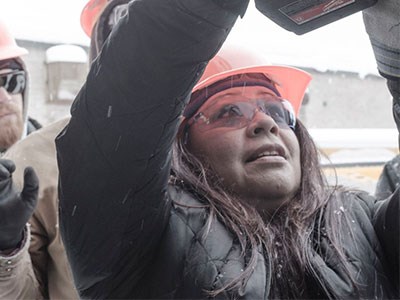Residents in First Nations communities along the North Shore of Lake Huron are being trained for employment readiness in the renewable energy field, all while staying in their home communities.
Over the last year, Sault College has facilitated on-reserve training in the communities of Batchewana First Nation, Garden River First Nation, M’Chigeeng First Nation and Aundeck Omni Kaning (AOK) First Nation. With seats available for 120 people, currently 90 are taking advantage of the training, which will prepare them to work in the renewable energy field.
Carolyn Hepburn, the college’s director of Native education and academic upgrading, said the college anticipated an industry need, but also recognized that the Aboriginal demographic is the fastest growing population in Canada, and in the North Shore area there are a number of people who are ready to enter the workforce or pursue post-secondary education.
“Consulting with the First Nations and with our partners, there was an identified need for training in this area,” she said, noting Sault College has pinpointed Aboriginal education as a priority. “So it was really a matter of working closely to really design the program to meet the needs of our potential students with the hopes that we increase Aboriginal representation in the fields themselves.”
Of the six programs available, three vocational programs are being offered in Garden River, Batchewana and AOK. They will train the students in aspects of construction, carpentry, green construction and renewable energy. It will qualify them for entry-level carpentry or construction jobs, but credits earned can also be transferred to post-secondary courses, explained Ted Newbery, manager of continuing education.
“There are a lot of students that didn’t finish high school that want to participate in the workforce that really need that opportunity to get some academic upgrading and fulfill their career goals and try to continue on with education,” Newbery said.
The other three programs are Ontario College Certificate programs. Students in Batchewana and M’Chigeeng can take construction and carpentry techniques programs, while students in Garden River can study renewable energy and green construction techniques.
Feedback from students has been positive. The college received 200 applications to the six programs. Providing students with the opportunity to study in their home communities makes training a more accessible goal, Newbery said.
It reduces barriers such as cost, transportation and being away from family, which can be especially important for people with children or elderly parents in their care. Students also get to learn in an environment in which their culture is all around them, which many find to be comforting, he added.
Hepburn believes the collaboration is an example of effective programming. The college was able to meet the needs of its students, while learning more about the communities’ priorities and also teaching their students about the opportunities in post-secondary education.
“These are all potential role models moving forward, as well,” Hepburn said. “We’re talking about sustaining economic development and capacity building within our First Nations communities, so I’m really pleased with the work that’s been done to date and I’m hoping this is just the start of bigger things down the road.”
Funding for the program, which came from the Northern Training Partnership Fund, runs out at the end of March, but Newbery said the college is still committed to finding ways to engage nearby First Nations communities.




